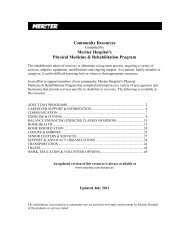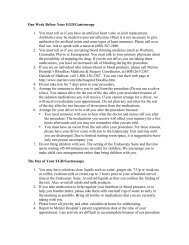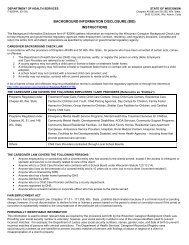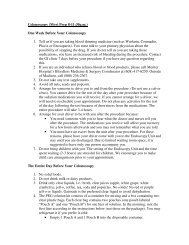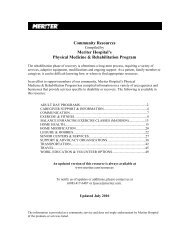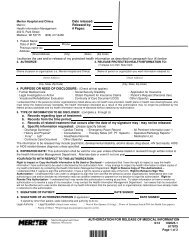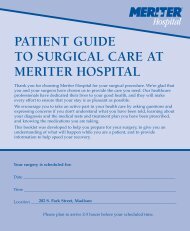A Guide To Your New Family's First Weeks - Meriter Health Services
A Guide To Your New Family's First Weeks - Meriter Health Services
A Guide To Your New Family's First Weeks - Meriter Health Services
You also want an ePaper? Increase the reach of your titles
YUMPU automatically turns print PDFs into web optimized ePapers that Google loves.
Caring for the Foreskin and Deciding About Circumcision<br />
Baby boys are born with foreskin, a skin covering the end of their penis. The foreskin helps to protect the penis and the opening<br />
(urethra) from stool and other irritants. The foreskin normally clings to the head of the penis for the first years of life and then<br />
naturally separates.<br />
By age three or four, most boys will have foreskins that fully retract (pull back). Until then, you may clean the foreskin just like the<br />
rest of the baby’s skin. If the foreskin is not yet retractable, you should not force it away from the head of the penis. This can cause<br />
scarring and further difficulties with retraction.<br />
Once the foreskin is retractable, you can clean the head of the penis and inside of the foreskin easily with soap and water after first<br />
gently pulling the foreskin back from the head of the penis. After cleaning, gently pull the foreskin back over the head of the penis.<br />
you leave the foreskin retracted, the foreskin can swell which makes it harder to pull back over the head of the penis. When a boy is<br />
old enough, he can learn how to keep his penis clean just as he will learn to keep other parts of his body clean. Good hygiene of the<br />
foreskin will help prevent problems with infection or difficulty retracting the foreskin.<br />
What is Circumcision<br />
Circumcision is a surgical procedure that<br />
permanently removes the foreskin, exposing the end<br />
of the penis. There is some evidence of potential<br />
medical benefits for circumcision. The evidence,<br />
though, is not enough to recommend that all<br />
newborn boys be circumcised, as there are also risks<br />
and disadvantages to circumcision.<br />
You are the best person to determine what is in<br />
the best interest of your son, and we have included<br />
the following information to help you in making<br />
an informed decision. You can also talk to your<br />
baby’s doctor before deciding. If you do decide to<br />
have your son circumcised, we will ask you to sign a<br />
consent form.<br />
Why Do Some Parents Choose<br />
Circumcision For Their Sons<br />
Parents choose to have their sons circumcised for<br />
various reasons. In some cultures, circumcision is<br />
a religious practice. In other cultures, parents want<br />
their sons to look like the other men in their family<br />
or community. Some parents may be concerned that<br />
cleaning the foreskin will be difficult. Other parents<br />
choose to have their baby circumcised as a newborn<br />
as they know that a circumcision done in the first few<br />
months of life avoids the risks of general anesthesia,<br />
which is generally needed if the procedure is done<br />
later in life.<br />
Why Do Some Parents Choose Not <strong>To</strong><br />
Have Their Sons Circumcised<br />
Most cultures do not commonly perform<br />
circumcision. The majority of boys with families<br />
from Asia, South America, Central America and<br />
most of Europe are not circumcised. Some parents<br />
believe the benefits of circumcision are not enough<br />
to warrant the surgery, or that the risks are too high.<br />
Some parents prefer that their sons choose for<br />
themselves when they are older. There has also been<br />
a concern that removing the foreskin will interfere<br />
with a man’s sexual experience. Recent research,<br />
however, shows this is not a concern.<br />
What Are the Potential Benefits of<br />
Circumcision<br />
There are several potential medical benefits of<br />
circumcision. In the first year of life, circumcised<br />
boys have a decreased risk of urinary tract infections.<br />
After the first year, however, the risk of a urinary<br />
tract infection is so low that circumcision provides<br />
no additional benefit. Removing the foreskin<br />
prevents the chance that the foreskin could cling<br />
to the head of the penis for too long or that the<br />
foreskin could stay in a retracted position. Although<br />
there is a slightly decreased risk of cancer of the<br />
penis or sexually transmitted diseases in adult<br />
circumcised men, the overall risk is very low if a<br />
boy/man cares for his foreskin properly and has low<br />
risk-taking behaviors.<br />
39




